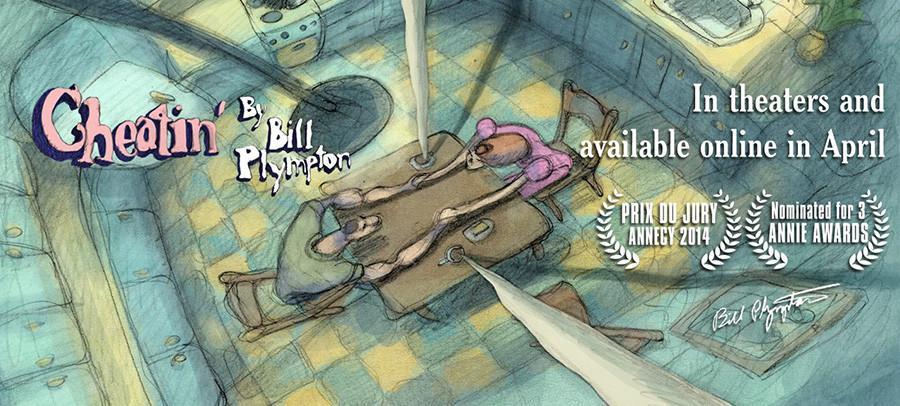Animated film beautiful but flawed
Bill Plympton’s “Cheatin’” has been nominated for three Annie Awards, the highest honor in animation.
April 8, 2015
Animation is typically directed toward children and produced by major studios, so it is understandably difficult for an independent animator making films for an adult audience to find much success in appealing to a wider audience. Bill Plympton, a prominent figure in indie animation, has been working under the radar for almost 40 years, occasionally producing shorts for “The Simpsons” gags and a Weird Al music video but primarily crafting distinctive shorts and feature films. His new film “Cheatin’,” a surreal, dialogue-free love story funded through Kickstarter, keeps with his tradition of hand-drawn animation dealing with mature themes by using an absurdist sense of humor.
The story begins with protagonists Jake and Ella meeting and falling in love at a bumper car track. They settle down for a life together, but soon a jealous
woman fools Jake into believing that Ella is unfaithful. A comedy of errors ensues and Ella concocts a plan involving a magician and his soul machine to save the relationship. The plotline is not particularly revelatory, and the misunderstandings that drive the main arc feel too much like clichés.
Additionally, the gender roles depicted in “Cheatin’” are somewhat outdated. Multiple sequences show Jake rescuing a helpless Ella, essentially forcing her into the archetype of the submissive housewife who is willing to forgive Jake for his wrongdoings. One can attribute this to the exaggerated and absurdist plot and cinematic style, but they lead to eye-rollingly trite characterization all the same.
However, it is the beautiful imagery, not the plot, that makes “Cheatin’” a captivating experience. Plympton’s commitment to surrealism makes for breathtaking images — cacti erupting out of the floor to represent loneliness, and kitchen objects dancing to celebrate the ferocity of the couple’s love. The exquisitely detailed, dreamline sequence could only come from an imagination as rich as Plympton’s. His characteristic drawing style of elastic figures with exaggerated body proportions that contort and stretch into any shape he pleases adds to the emotional impact of the visual imagery. Animation allows for the creation of fantasies that are very difficult to depict in live-action film, and he utilizes the medium’s full range.
“Cheatin’” could possibly appeal far beyond Plympton’s relatively niche fanbase. It has already generated some buzz, from its nomination for Best Feature at last year’s Annie Awards where it lost to “How to Train Your Dragon 2” in what must have been an especially devastating defeat for Plympton.
Nevertheless, Plympton has crafted his unique vision into a distinct work that could not have been made by a major studio. As “Cheatin’” exemplifies, there is no mistaking his style of animation for any other creator’s work, proving that the possibilities are endless when an animator has extensive creative freedom.
A version of this article appeared in the Wednesday, April 8 print edition. Email Zach Martin at [email protected]




























































































































































